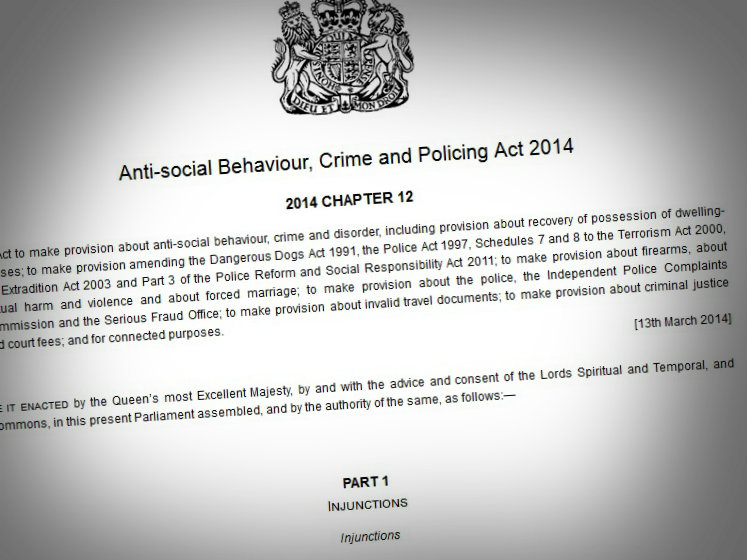This week seemingly, like Banquo’s Ghost in Macbeth, a new law has appeared to haunt us and disappeared at the final curtain, unnoticed. This week the Anti-social Behaviour, Crime and Policing Act 2014 (ABCP) came into force. It is to give additional powers to the police, local authorities and some in the private sector to deal with problem people and situations.
The background is that the European Union and UK political parties over the last decade have had terrorism or anti-social behaviour thrust onto their agendas from an often, frightened or intimidated public.
Whilst often an eager general public seem keen to embrace new laws and new personal restrictions, civil liberties groups ask whether it is worth the price on individual freedom and implied undemocratic laws which compromise the spirit if not the letter of Magna Carta.
In the Anglo-sphere, 799 years ago King John was the first monarch to admit that he was not omnipotent and was subject to the same legislation as the people. Indeed, the late Tony Benn on hearing the Counter-Terrorism Acts were to include the right by the police to hold a suspect for ninety days without being informed of the charges opined: “I never thought I would be in the House of Commons on a day when Magna Carta was repealed.” The current limit is twenty-eight days.
Currently Chris Grayling, the Lord Chancellor and Secretary of State for Justice, is trying to get the maximum sentence for internet “trolls” increased from six months to two years in jail.
Edward Snowden the whistle-blower or traitor, depending on your point of view, said recently that the UK’s GCHQ uses “unlawfully collected information…” and “poses a danger to the UK’s legal and justice systems because evidence is being collected against individuals who don’t have the ability to challenge it in courts.”
The Regulation of Investigatory Powers Act 2000 (RIPA) was ostensibly introduced to enable surveillance and investigations in the modern internet age. David Blunkett, the former Home Secretary, was at pains recently to castigate the police for spying on journalists by complaining: “I brought in RIPA to hunt criminals, not fetter a free press”. Equally pernicious are councils spying on parents to confirm that they live in the right catchment area for a good school.
ABCP as I mentioned gives unprecedented powers to local authorities and the police to ban any activity they judge to have a “detrimental effect” on “quality of life.” Offenders can also be given a Community Protection Notice (CPN) and have their equipment seized such as “sound making equipment” such as a guitar if you are a busker.
Fines can be levied on the spot by police, council officers and even private contractors. Any person can be ordered from an area for up to forty-eight hours if there are “committing or likely to commit anti-social behaviour.”
The offender can have any property confiscated, their exit route defined and violators face fines of a £100 and up to three months in prison.
Civil Injunctions (CI) are to replace Anti-Social Behavioural Notices (ASBOs). Groups who may apply for a CI include police, council, NHS, Environmental Agency, a housing provider, the chief constable of the British Transport Police Force, or Transport for London.
Opposition has come from a disparate range of organisations, of both the left and the right. On 21 October, the Manifesto Club hosted at a debate. Chaired by Josie Appleton, the audience heard from Jonny Walker of Keep Streets live, Ms Val Stevenson of The Pavement Magazine, Matthew Varnham of Occupy London, Simon Calvert of Reform Clause 1 and human rights campaigner Peter Tatchell.
Calvert mentioned the irony that as a committed Christian, he had joined forces with the National Secular Society to oppose the law. Walker mentioned that buskers’ guitars could be confiscated, Stevenson of the extension of homeless’ sleeping bags and food being taken by police. Varnham mentioned how the right to protest could be compromised by cease and desist notices. Parents also could be fined £100 for parking outside a school to drop their children off.
However, Tatchell encapsulated what many in the room were thinking: that there were already adequate laws to deal with real anti-social behaviour. It gives far too much power to public and private bodies, it can be used to suppress free speech, and disproportionately penalise the most vulnerable. Asked whether homophobic ranters be allowed to vociferously state their case in public, the answer was an unequivocal yes.
It did not take long for Blackpool Council to act. One day after the law came in they are looking to ban men from wearing mankinis.
A senior Conservative MP said to me privately that if you give the government powers, they abuse them. Alas, we appear to have ample evidence.

COMMENTS
Please let us know if you're having issues with commenting.